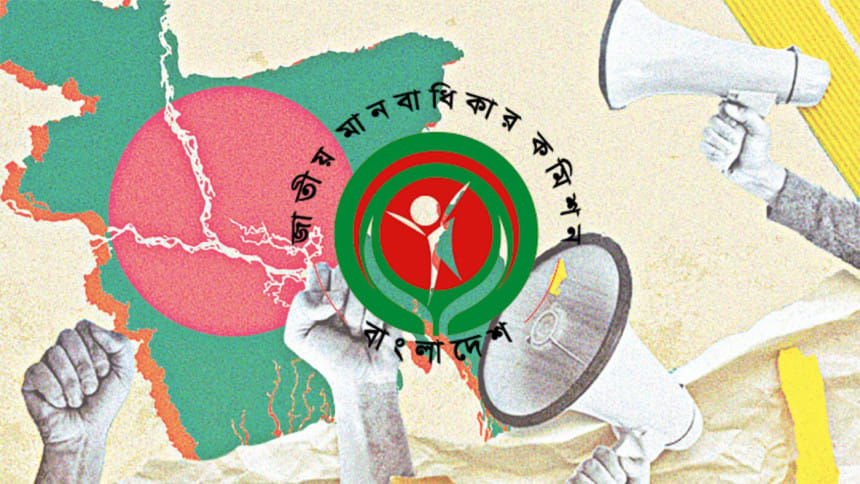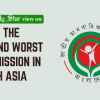The National Human Rights Commission also requires reform

Bangladesh is at a pivotal moment in history. After one and a half decades in the tight grip of authoritarian practices, the country has now had more than nine months to begin forging a path towards a new future.
While addressing the multiple areas that are in desperate need of systemic reform, the interim government must not lose sight of the important legal and institutional reforms that can ensure an enduring respect for human rights. One such institution is the National Human Rights Commission (NHRC), which could, if reformed, be key to robust oversight, redress, and accountability for human rights violations.
The NHRC has historically had glaring shortcomings in fulfilling its function as an independent mechanism to promote and monitor compliance with international standards on human rights and the rule of law. These failings led the UN accreditation body Global Alliance of National Human Rights Institutions (GANHRI) to give the NHRC a "B" rating in April 2025, for the third consecutive time since its initial accreditation, meaning that it only partially complies with international standards.
The importance of the NHRC cannot be emphasised enough. If, during the last decade, it had functioned according to international standards, with the capacity and willingness to hold inquiries with authorities in cases of enforced disappearances and to carry out unannounced visits to detention sites, victims of human rights violations could have had an avenue for redress. Instead, it remained inefficient. Its inability to intervene for the protection of human rights reached abysmal depths during last year's July uprising, when, on July 30, the then chairman of the organisation reacted to the massacre of protesters with a mere statement calling the situation "unfortunate and a violation of human rights."
The NHRC currently stands vacant, following the resignation en masse of its commissioners in November 2024, three months after the interim government came into power. However, simply appointing new commissioners would be insufficient to ensure that the institution functions independently and effectively. Instead, several amendments must be made to its founding legislation, the National Human Rights Commission Act, 2009, to achieve this end.
International standards on human rights institutions, set out in the Paris Principles, state that such institutions must be impartial and independent. However, the current politicised process of appointing NHRC members runs against these ideals. The process is led by a seven-member selection committee, with a majority of members from the ruling party: the speaker of the house, two ministers, the cabinet secretary, as well as a ruling party MP. The selection process must be participatory, inclusive and transparent. For example, a model like Sri Lanka's Constitutional Council, which has representatives from the legislature (both government and opposition) and civil society, would better ensure the respect of such principles.
The Paris Principles also require that national human rights institutions have a broad mandate and adequate powers. Such a scope would enable the NHRC to investigate any human rights violations, collect evidence, work with civil society and government actors, and make their findings and recommendations public. Critically, the NHRC Act also stipulates that the commission's powers do not extend to matters relating to the conduct of public servants and public sector workers. These exemptions must be removed, and all public authorities, including the military, police, and intelligence agencies, must come within the NHRC's purview.
According to the Paris Principles, human rights institutions must have adequate resources to carry out their functions independently, free from external influence or the fear of financial retribution. The NHRC Act sets out that a human rights commission fund will be constituted to finance the institution. However, the fund can only be serviced by annual grants made by the government or grants made by local authorities. This provision puts the NHRC at the mercy of government funding, which may be revoked at any time. The state must be compelled by law to provide adequate funding to the commission, as part of a national budgetary allocation, to discharge its functions, with a guaranteed minimum sum that the NHRC can access without fear of revocation.
While these amendments are just the beginning in ensuring adequate oversight by the NHRC, they are indeed a matter of urgency if victims of human rights violations and abuses are to have an efficient, effective human rights mechanism to approach for redress in Bangladesh now and in the future.
Rehab Mahamoor is regional researcher at Amnesty International.
Views expressed in this article are the author's own.
Follow The Daily Star Opinion on Facebook for the latest opinions, commentaries and analyses by experts and professionals. To contribute your article or letter to The Daily Star Opinion, see our guidelines for submission.

 For all latest news, follow The Daily Star's Google News channel.
For all latest news, follow The Daily Star's Google News channel. 










Comments